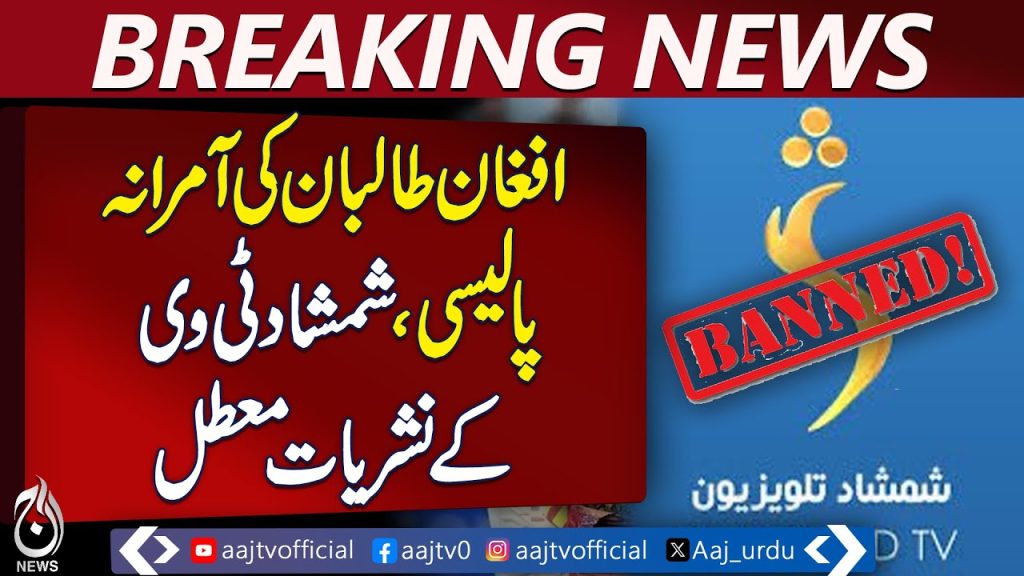Listen to the article
Afghan authorities have suspended the broadcasting license of Shamshad TV, a prominent Afghan television network, marking the latest move in the Taliban government’s growing restrictions on media freedom in the country.
The suspension, confirmed by multiple sources in Kabul, came after the network allegedly violated a recent government directive prohibiting media outlets from broadcasting content deemed critical of neighboring Pakistan. The Ministry of Information and Culture issued the order late yesterday, effectively taking the channel off air immediately.
Shamshad TV, established in 2006 and known for its wide-reaching broadcasts across Afghanistan, has built a reputation for relatively independent coverage in the country’s evolving media landscape. The network reaches millions of Afghan viewers and has been one of the few remaining voices offering diverse perspectives since the Taliban’s return to power in August 2021.
According to Taliban officials who spoke on condition of anonymity, the suspension stems from programming that “undermined diplomatic relations with regional partners.” The specific content in question reportedly included coverage of border tensions between Afghanistan and Pakistan, as well as commentary on Pakistan’s influence in Afghan domestic affairs.
Media watchdog organizations have condemned the move as part of a troubling pattern of press restrictions. Reporters Without Borders noted this represents the seventeenth media outlet closure in Afghanistan since the beginning of 2023, reflecting a systematic dismantling of independent journalism in the country.
“This suspension follows an alarming trajectory of media suppression,” said Ahmad Quraishi, a press freedom advocate based in Central Asia. “What began with content guidelines has evolved into outright censorship of any narrative that doesn’t align with the Taliban’s diplomatic and political objectives.”
The Afghanistan Journalists Center documented that more than 200 media outlets have ceased operations since the Taliban takeover, with over 6,000 journalists losing their jobs. Female journalists have been particularly affected, with their numbers dropping by nearly 80 percent.
Relations between Afghanistan and Pakistan have grown increasingly strained in recent months, with tensions centered on border security, terrorism allegations, and trade disputes. The Taliban administration appears to be taking steps to mitigate diplomatic friction by controlling domestic narratives about its eastern neighbor.
Pakistan has long been accused of providing support to the Taliban during their insurgency against the previous Western-backed Afghan government, though Islamabad has consistently denied these claims. Since taking power, the Taliban have attempted to balance nationalist sentiment within Afghanistan with the practical need to maintain workable relations with Pakistan.
International observers note that media control has become a cornerstone of the Taliban’s governance approach. Initial promises of a more moderate stance have given way to increasingly restrictive policies affecting journalism, education, women’s rights, and civil liberties.
“The suspension of Shamshad TV sends a clear message to remaining media outlets,” said Maria Saleh, an analyst focusing on South Asian politics. “The space for independent reporting on sensitive regional relationships is rapidly disappearing.”
Media executives and journalists in Kabul expressed concern that the suspension may become permanent, following a pattern seen with other outlets. Many journalists have already fled the country, while those remaining operate under increasingly difficult conditions, including vague content guidelines that can lead to detention.
The United Nations Assistance Mission in Afghanistan has repeatedly called on the Taliban to respect press freedoms, emphasizing that independent media is essential for social progress and effective governance. These calls have thus far yielded limited results.
As Afghanistan continues to face severe economic challenges and humanitarian crises, the diminishing space for public discourse and information sharing further complicates efforts to address the country’s mounting problems. The silencing of yet another media voice represents not just a blow to press freedom, but to the Afghan public’s right to diverse sources of information about crucial regional relationships that impact their daily lives.
Fact Checker
Verify the accuracy of this article using The Disinformation Commission analysis and real-time sources.




7 Comments
I wonder if this move is part of a broader effort by the Taliban to clamp down on critical reporting and limit the flow of information. It’s crucial that all voices, including those critical of the government, are able to operate freely.
You raise a good point. Restricting media outlets, even under the guise of diplomatic concerns, could set a dangerous precedent and further erode press freedom in the country.
This highlights the fragile state of media freedom in Afghanistan under the Taliban’s rule. I’m concerned about the implications for the free flow of information and the public’s access to diverse perspectives on important issues.
It’s troubling to see the Taliban taking steps to restrict independent media outlets. A healthy democracy requires a vibrant and uncensored press, so I hope they reconsider this decision and work to protect press freedom going forward.
I agree. Maintaining an open and critical media is crucial for holding the government accountable and ensuring the public is well-informed. This move by the Taliban is a worrying sign.
While the Taliban may have concerns about the content, suspending a major TV network seems like a heavy-handed response. I hope they reconsider and find a way to address any issues through dialogue and without resorting to censorship.
This is a concerning development for press freedom in Afghanistan. Suspending a prominent TV network for alleged anti-Pakistan content raises worrying questions about the Taliban’s commitment to an independent and diverse media landscape.